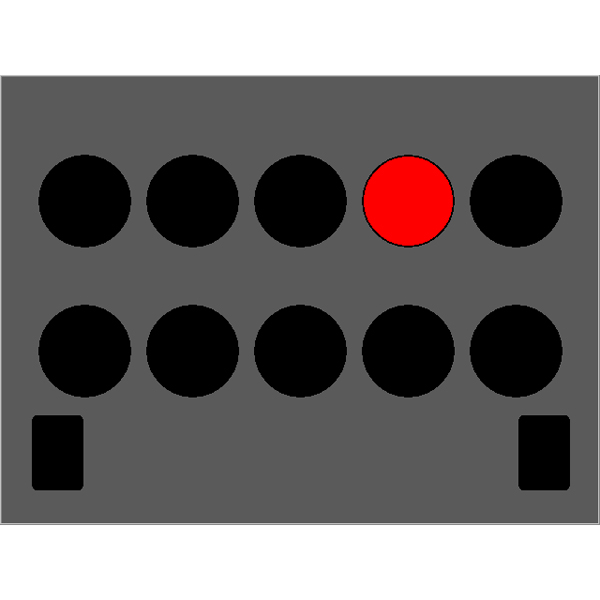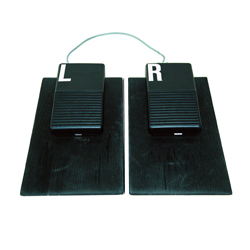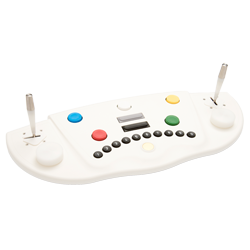
Measurement of reactive stress tolerance, attention deficits and reaction speed in the presence of rapidly changing and continuous optical and acoustic stimuli.
The Determination Test (DT) is an especially accurate measurement instrument and applied to assess reactive stress tolerance.
The central objects of measurement in the DT-test are reactive stress tolerance and the related reaction speed. The DT-test requires, as cognitive partial performances, to discriminate colors and acoustic signals, to memorize the relevant characteristics of stimulus configurations and response buttons as well as the assignment rules, and to select the relevant reactions according to the assignment rules laid down in the instructions and / or learned during the course of the test. The difficulty of the DT-Test lies in the production of continuous, sustained rapid and varied reactions to rapidly changing stimuli.
This test is an enhanced version of the Vienna Determination Unit (DUnit). However, the color stimuli are presented via the monitor and the acoustic stimuli via the Test System interface. The respondent reacts by pressing the appropriate buttons on the panel. In spite of these differences, studies show that the results of DT and D-Unit coincide to a large extent (Karner & Biehl, 2001). Stimulus presentation occurs in three different ways, namely in the adaptive mode (the presentation speed adjusts to the performance level of the respondent), in the action mode (no time limit) and in the reaction mode (fixed time limit). The headsets supplied guarantee an undisturbed stimulus presentation.
The following test forms were mainly developed for clinical examinations:
Depending on the stimulus / reaction mode, the variables Median reaction time, Number of correct reactions (on time, delayed), Number of incorrect reactions, Number of omitted reactions, and Number of stimuli are scored.
For all test forms the internal consistencies for the main variables lie between r=0.98 and r=0.99.
An extreme-group validation carried out by Karner (2000) found significant differences in the Determination Test between drivers who had committed alcohol-related offenses and the norm group. The test results of the drivers who had committed alcohol-related offences were significantly worse than those of the norm population. A study by Neuwirth and Dorfer (2000) showed that the Determination Test could distinguish between all the referral groups tested in the course of a traffic-psychological assessment (psychi-atric and neurological clients, clients who had been involved in alcohol abuse) and the norm group. A study by Karner & Neuwirth (2000) showed significant correlations between the result of the DT and a driving test. The convergent validity of the test was demonstrated by Karner & Biehl (2000), who found that it correlated with the construct-related RST3 test. Other studies carried out in the field of traffic psychology also confirm the validity of the test.
For the DT forms S1 – S6 representative norms are available that vary in size between N=102 and N=1179; some of the norms are also available separated according to age, gender and educational level. Special norms from among the following are also available for these forms: norms for drivers with conspicuous behaviour, Portuguese norm sample, Portuguese norms for drivers with conspicuous behaviour, norms of stroke patients, norms of German professional drivers.
Between 6 and 15 minutes (including instruction and practice phase), depending on test form.
The Schuhfried VTS enables computer-assisted application of a large number of highly diverse psycho-diagnostic tests and measuring procedures. In developing the system much emphasis was placed on transparent structure and largely uniform design. It is therefore simple to operate and easy to understand and does not require any special computer skills.
The VTS basic module is required for administration of any of the available tests.
The Schuhfried VTS supports the administration of both single tests and test batteries. Many of the single tests are available in different test versions. These test versions may differ, for example, in terms of test duration or difficulty or may be parallel forms. They are characterized by different parameters reflecting specific test requirements. They have been designed for administration to a specific population (e.g. psychiatric patients, children, etc.) or for special measuring purposes (e.g. repeated measurements). Test batteries are compiled from the available single tests and test versions.
The Standard Panel allows for user-friendly data input and can be used for many different tests. The test selected determines if the panel is needed. Consult the test's description to see if this panel is required.
Large left and right foot switch pedals for use with tests requiring foot responses. These foot pedals are used with the Standard Response Panel, model 64024, or with the Universal Response Panel, model 64025.
The Schuhfried VTS enables computer-assisted application of a large number of highly diverse psycho-diagnostic tests and measuring procedures. In developing the system much emphasis was placed on transparent structure and largely uniform design. It is therefore simple to operate and easy to understand and does not require any special computer skills. This VTS basic module is required for administration of any of the available tests.
The universal panel allows for user-friendly data input and can be used for many different tests. The test selected determines if the panel is needed. Consult the test's description to see if this panel is required.
Many tests present audio stimuli, these headphones ensure the client hears the stimuli without disturbing those around them. Headphones connect to either of the Response Panels, models 64024 and 64025.


